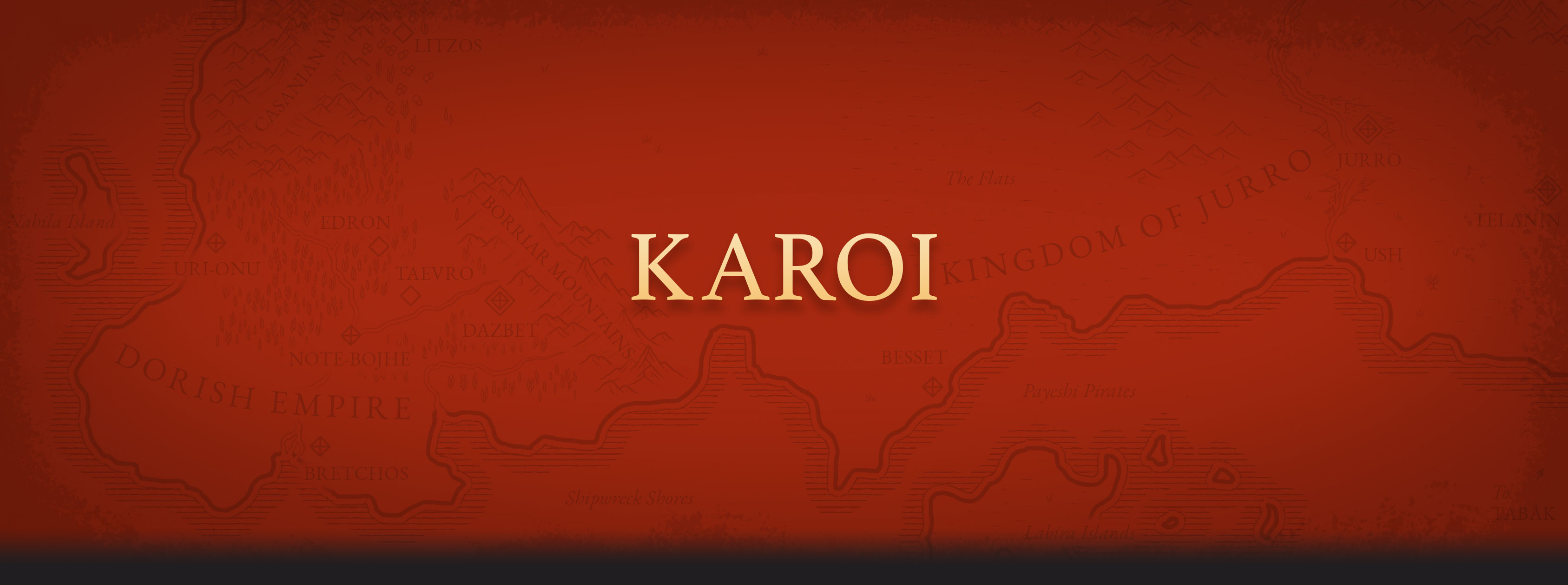Karoi
Karoi is the language spoken by the three major cultures in the Karoa region, including the Mosori, Sabani, and Ilisi. Each have slight differences in accent and local lingo.
Note: This page is still a work in progress. Much more is to come.
Phonology
Accent
The h sound in Mosori is pronounced in the back of the throat, and is emphasized with varying degrees in different tribes. Most northern tribes enunciate it clearly, but it is common for southern tribes to make the h sound breathier, or to even drop it altogether — especially in casual settings.
Throughout Mosoria, people speak with a small mouth shape, and vowels are brief and sharp. Harder consonants like k and t are usually softened a bit. The t sound is made at the very front of the mouth, right behind the teeth.
Vowel pronunciation guide
- a is a flexible character in Latin scripts, and when used for Mosori words it can either indicate ah, aw, or uh. It is a stand-in for two separate characters in Mosori; one for ah and aw, and another for uh. If unsure which sound you should use, consult the Google Doc dictionary. Note: In some cases where ah is written in the dictionary, a northerner would still say aw. This slight variation in accent is overlooked in the dictionary, in favor of representing the most common pronunciation.
- ae is always pronounced ey, as in prey. Note that in the Karoi writing system, this sound is one letter, not two. If the a and e are meant to be pronounced separately, they will be written as follows: a'e. This would be indicated by two separate characters when writing in the Karoi script.
- ai is always pronounced ahy, as in my. Note that in the Karoi writing system, this sound is one letter, not two. If the a and i are meant to be pronounced separately, they will be written as follows: a'i. This would be indicated by two separate characters when writing in the Karoi script.
- If you encounter a vowel combination like aii or aei, you can assume it is two syllables, since there is no apostrophe separating the a from the first i or e. The vowel combinations previously mentioned, for example, would be pronounced ahy-ee and ey-ee, respectively.
- oi is not a diphthong Mosori, unlike ae and ai. The sound you hear in the English words toy and joy does not exist in Mosori. Instead, wherever you see oi, read it as two syllables: oh-ee.
- ao is also not a diphthong. The sound you hear in the English words bow and howl does not exist in Mosori. Wherever you see ao, pronounce it as ah-oh, and add a slight stop between each sound rather than letting them slur together.
Vocabulary
See full vocabulary in the official Google Doc.
Spoken by
Common Phrases
Note: See full list of phrases, idioms, and expressions in the official Google Doc.
Sohana
Greetings (formal)
Soa, nisai an ahi?
Hi, how are you?
Navi siiha, dae ahi?
I'm good, and you?
Sani
Fine
Imorae
Great, amazing, fantastic
Sorana
Okay, all right, stable, healthy, functioning
An no mahi ala?
What's your name?
An no mavi Lasía.
My name is Lasía.
Alamahána
Good morning (literally: bright morning)
Lorhana/Lorana
Good day (literally: bright day) (common with northern tribes)
Alorabae
Good day (literally: blessed day) (common with southern tribes)
Karanasih
Goodnight
Nasa
Sorry
Ennali
Excuse me, pardon me
An aki mahani
It's all good, no worries, apology accepted
Mahani
It's all good, no worries, apology accepted (shortened)
Ahani?
All good? Okay? Is that agreeable to you?
Common Female Names
Note: The Mosori people acknowledge five genders. These names are for the two "feminine" genders.
Adaela
Strong one
Alaea
Happiness
Alaia
Love
Alaii
Loved, Beloved
Alora
Caring one
Kaína
Strong one
Lorini
Caring one
Saelani
Helper
Sairani
Unknown meaning
Sari, Saria
Dance
Saruni
One who trusts, one who is trustworthy
Common Male Names
Note: The Mosori people acknowledge five genders. These names are for the two "masculine" genders.
Adaelo
Courageous one
Davani
Spirit, spirited
Falii
Dusty
Kaíno
Strong one
Masano
Boulder, stone
Saelano
Helper
Saruno
One who trusts, one who is trustworthy
Common Unisex Names
Remove these ads. Join the Worldbuilders Guild









Comments